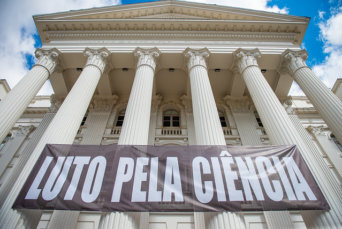- About
- Topics
- Picks
- Audio
- Story
- In-Depth
- Opinion
- News
- Donate
- Signup for our newsletterOur Editors' Best Picks.Send
Read, Debate: Engage.
| topic: | Good Governance |
|---|---|
| located: | Brazil |
| editor: | Ellen Nemitz |
In September, the Federal University of Parana, the oldest Brazilian university running uninterruptedly for more than 100 years, may no longer be able to pay for some of its key expenses. The institution is the 10th best university in the country and the 8th in science production ranking.
However, almost four months after the announcement of a 10 billion dollars investment "contingency" for all Brazilian universities – the Federal University of Parana has lost 10 million dollars – the institution has reached a crucial moment. “Until now we have paid all the bills. However, if money does not come back, outsourced contracts may be affected, like cleaning, maintenance, surveillance and reception desk”, the University Press Office informs FairPlanet.
Professors’ salaries payment will not be affected, because they are mandatory expenses. Nonetheless, all activities may be affected and even paralysed if other expenses are not paid. More than 33 thousand students are currently studying in 164 graduate courses and 89 postgraduate programmes across the country, according to the University Press Office. Also, students and professors work for local communities in more than 500 extension programmes.
The situation, of course, is not unique. All federal universities are facing difficulties, including some traditional like the ones headquartered in Rio de Janeiro, Bahia, Distrito Federal, Rio Grande do Sul and Minas Gerais. These institutions are responsible not only for education but are also responsible for important researches. For example, in Minas Gerais, researchers are aiming to fight liver cancer; in Rio de Janeiro, Molecular Virology Lab may be forced to stop studies of the Chikungunya virus, and projects surrounding the zika virus and yellow fever have already been affected in Minas Gerais.
Earlier this year, the federal government had already announced a 42 precent "freezing" of investments in the sciences, affecting the scholarships’ payment and the purchase of essential raw material. According to the National Council for Scientific and Technological Development (CNPq, in Portuguese), payment for almost 80 thousand researchers was guaranteed only until August. The contingency of investments may also affect the huge project Sirius, a particle accelerator installed in Campinas, in the state of São Paulo.
Scientific and academic communities are struggling to survive and to keep a job in education and research. They can count on some congress members who gathered in April to defend the autonomy and appreciation of the federal universities, but they are not hopeful about the new programme announced by the government: Future-se, in Portuguese, or Future Yourself, in English.
The programme aims to strengthen the administrative, financial and management autonomy of federal universities and institutions, according to the official government website. But the Federal University of Parana has rejected the programme as it was presented for society, after many public discussions. A document released in August explains that there are many points still to be discussed and clarified. For now, it seems to threaten the institution's autonomy instead.
The contingencies, both in education and the sciences, have been communicated as temporary until the economy improves. However, in a developing country like Brazil, putting the education systems and scientific advancement in danger may be a fatal error with irreparable consequences. “Until this moment, there was a small non-official sign that part of the money would return in September, but the university has not been officially communicated with. The institution reaffirms, though, that it will keep working delicately until the last cent”, says the Federal University of Parana Press Office.
Image: Acervo UFPR/Marcos Solivan
